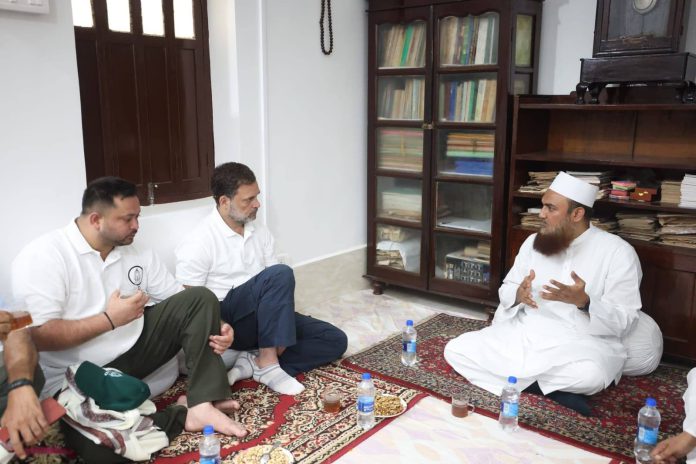Synopsis : Khanqah Rahmani visit by Rahul Gandhi and Tejashwi Yadav has ignited debate on Muslim representation, mob lynching, Sharjeel Imam’s imprisonment, and Faisal Rahmani’s personal ambitions.
By Qalam Times News Network
Dateline: Patna, 29 August 2025
A Visit Wrapped in Symbolism
Khanqah Rahmani became the stage of political theatre on August 22 when Rahul Gandhi, joined by Tejashwi Yadav, Mukesh Sahni, Dipankar Bhattacharya, and K.C. Venugopal, arrived in Munger. The centuries-old Sufi center welcomed them with disciplined rows of students and clerics, but behind the warm courtesies, hard questions now echo: did this visit serve the Muslim community—or did it simply elevate Hazrat Maulana Ahmad Wali Faisal Rahmani’s personal stature?


Faith, Politics, and Personal Calculations
Faisal Rahmani, the current Amir-e-Shariat, deliberately widened the encounter into a collective affair by summoning representatives of multiple Muslim organizations. The intent seemed to showcase unity. Yet critics argue that Khanqah Rahmani was used more as a backdrop for Rahmani’s self-projection, especially as he faces challenges within Imarat-e-Shariah. The speculation intensifies: was this also an indirect bid for a Rajya Sabha seat?
Questions That Refuse to Go Away
- Did Rahul Gandhi or Tejashwi Yadav address the unending mob lynching of Muslims across India?
- Was there any word on Sharjeel Imam’s prolonged imprisonment, or the plight of Muslim political prisoners?
- Were promises made for fair political representation, jobs, education, or safety for Muslims?
- Or was this gathering more about photographs and optics than real commitments?
- And most pointedly—did Faisal Rahmani speak truth to power, or did he soften his voice in hopes of political favor?
Echoes of the Past, Shadows of the Present
Observers recall how Wali Rahmani’s massive “Deen Bachao, Desh Bachao” rally in 2018 electrified the Muslim masses but produced few structural gains beyond one legislative berth. Seven years later, his son faces the same test: will this moment crystallize into genuine advocacy—or dissolve into personal positioning?
Waqf Rally and the Missing Board
The “Waqf Bachao, Dastoor Bachao” rally at Patna’s Gandhi Maidan weeks earlier showed Faisal Rahmani’s ability to summon lakhs in disciplined unity against the Waqf Amendment Act 2025. Yet the All India Muslim Personal Law Board was absent, neither represented nor endorsing. Was it sidelined, or distancing itself? And does that absence expose a growing rift between Imarat-e-Shariah and other Muslim platforms?
Voices from the Community
Qalam Times spoke with Muslims in Patna, Munger, and beyond. A clear majority felt that the Khanqah Rahmani visit offered little for ordinary Muslims. “Mob lynching continues, Sharjeel Imam is still in jail, our youth face police profiling, our institutions are under pressure—yet none of this was spoken about openly,” one respondent said. Another added, “This was not our empowerment; it was Faisal Rahmani’s show of power.”
The Larger Test Ahead
The road forward remains unwritten. If Rahul Gandhi truly wishes to engage Muslims, his gestures must translate into action: addressing lynching, freeing political prisoners, ensuring representation, and protecting Waqf. If Faisal Rahmani seeks to be seen as a genuine leader, he must carry the weight of these issues—not merely his own political ambitions.
For now, Khanqah Rahmani has re-emerged as a symbolic stage where faith, politics, and personal interest intersect. But symbolism alone cannot shield a community that continues to ask, with growing impatience: who will speak for our real struggles?







